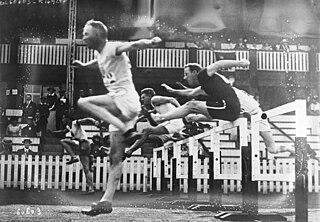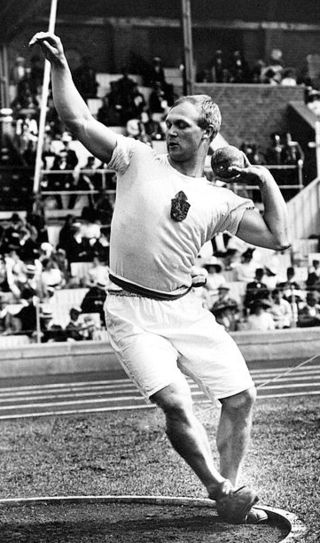
The men's 1500 metres was the third-longest of the seven men's track races in the Athletics at the 1964 Summer Olympics program in Tokyo. It was held on 17 October, 19 October, and 21 October 1964. 50 athletes from 34 nations entered, with 7 not starting the first round. The maximum number of athletes per nation had been set at 3 since the 1930 Olympic Congress. The first round was held on 17 October, with the semifinals on 19 October and the final on 21 October.

The men's 1500 metres middle-distance event at the 1932 Summer Olympics took place on August 3 and August 4 at the Los Angeles Memorial Coliseum. Twenty-four athletes from 14 nations competed. The 1930 Olympic Congress in Berlin had reduced the limit from 4 athletes per NOC to 3 athletes. The event was won by Luigi Beccali of Italy, earning the nation's first medal in the 1500 metres. Canada also won its first 1500 metres medal, with Phil Edwards's bronze.

The men's 200 metres event was part of the track and field athletics programme at the 1920 Summer Olympics. The competition was held on Thursday, August 19, 1920, and on Friday, August 20, 1920. Forty-eight sprinters from 22 nations competed. Nations were limited to 4 athletes each, down from the 12 allowed in previous Games. The event was won by Allen Woodring of the United States, the nation's second consecutive victory in the event and fourth in five Games. Fellow American Charley Paddock took silver. Great Britain reached the podium for a second consecutive Games with Harry Edward's bronze.
The men's 400 metres event was part of the track and field athletics programme at the 1920 Summer Olympics. The competition was held on Thursday, August 19, 1920, and on Friday, August 20, 1920. 37 runners from 16 nations competed. No nation had more than 4 runners, suggesting the limit had been reduced from the 12 maximum in force in 1908 and 1912. The event was won by Bevil Rudd of South Africa, the nation's first title in the event. Nils Engdahl's bronze was Sweden's first medal in the 400 metres.
The men's 800 metres event was part of the track and field athletics programme at the 1920 Summer Olympics. The competition was held from Sunday, August 15, 1920, to Tuesday, August 17, 1920. Forty runners from 17 nations competed. No nation had more than 4 runners, suggesting the limit had been reduced from the 12 maximum in force in 1908 and 1912. The event was won by Albert Hill of Great Britain, snapping a three-Games streak of American victories and starting a four-Games streak of British wins. Bevil Rudd, the 400 metres winner in 1920, took bronze to give South Africa its first medal in the 800 metres.
The men's 5000 metres event was part of the track and field athletics programme at the 1920 Summer Olympics. The competition was held on Monday, August 16, 1920, and on Tuesday, August 17, 1920. Thirty-eight runners from 16 nations competed.

The men's 110 metres hurdles event was part of the track and field athletics programme at the 1920 Summer Olympics. The competition was held on Tuesday, August 17, 1920, and on Wednesday, August 18, 1920. 24 runners from 15 nations competed. No nation had more than 4 runners, suggesting the limit had been reduced from the 12 maximum in force in 1908 and 1912. The event was won by Earl Thomson of Canada in world record time, the first victory by any nation other than the United States in the men's 110 metres hurdles and the first time that any non-U.S. nation had even been on the podium since 1896. Thomson, who had lived in the United States since age 8, had wanted to run for the U.S. team but was ineligible due to his Canadian citizenship. A British flag was displayed at the medal ceremony rather than a Canadian one because the organizing officials did not have the appropriate flag.

The men's 400 metres hurdles event was part of the track and field athletics programme at the 1920 Summer Olympics. The competition was held on Sunday, August 15, 1920, and on Monday, August 16, 1920. 19 runners from 9 nations competed. Nations were limited to 4 hurdlers each. The event was won by Frank Loomis of the United States, the fourth consecutive victory by an American. The United States secured its second sweep in the event, and first with other nations competing, with John Norton taking silver and August Desch bronze.
The men's 3000 metres team event was part of the track and field athletics programme at the 1920 Summer Olympics. It was the second appearance of a 3000-metre team race event after the debut in 1912, but the fifth time that a team contest was arranged at the Olympics. The competition was held on Saturday, August 21, 1920, and on Sunday, August 22, 1920. 31 runners from six nations competed.

The men's high jump event was part of the track and field athletics programme at the 1920 Summer Olympics. The competition was held from Sunday 15 to Tuesday 17 August 1920. 22 high jumpers from nine nations competed. No nation had more than 4 jumpers, suggesting the limit had been reduced from the 12 maximum in force in 1908 and 1912. The event was won by Richmond Landon of the United States, the nation's sixth consecutive victory in the men's high jump. The American team also took silver, with Harold Muller finishing second. Sweden won its first medal in the event with Bo Ekelund's bronze.

The men's pole vault event was part of the track and field athletics programme at the 1920 Summer Olympics. The competition was held on Wednesday, August 18, 1920, and on Friday, August 20, 1920. 16 pole vaulters from seven nations competed. No nation had more than 4 jumpers, suggesting the limit had been reduced from the 12 maximum in force in 1908 and 1912. The event was won by Frank Foss of the United States, the nation's sixth consecutive victory in the men's pole vault. Henry Petersen's silver was Denmark's first medal in the event and the first time a non-American had done better than bronze in the pole vault. Edwin Myers's bronze continued the American streak of winning at least two medals in each pole vault, however.

The men's long jump event was part of the track and field athletics programme at the 1920 Summer Olympics. The competition was held on Tuesday, August 17, 1920, and on Wednesday, August 18, 1920. 29 long jumpers from eleven nations competed. No nation had more than 4 runners, suggesting the limit had been reduced from the 12 maximum in force in 1908 and 1912. The event was won by William Petersson of Sweden, the first time an athlete not from the United States took gold in the long jump.

The men's discus throw event was part of the track and field athletics programme at the 1920 Summer Olympics. The competition was held on Saturday, August 21, 1920, and on Sunday, August 22, 1920. 17 discus throwers from eight nations competed. No nation had more than 4 athletes, suggesting the limit had been reduced from the 12 maximum in force in 1908 and 1912. The event was won by Elmer Niklander of Finland, the nation's second consecutive victory in the men's discus throw. Armas Taipale, the winner in 1912, took silver to become the second man to win multiple medals in the event. Gus Pope took bronze, continuing the American streak of podium appearances at all six discus competitions to date.

The men's 1500 metres was an event at the 1984 Summer Olympics in Los Angeles, California. The final was held on August 11, 1984. Fifty-nine athletes from 40 nations competed. The maximum number of athletes per nation had been set at 3 since the 1930 Olympic Congress. The event was won by 0.87 seconds by Sebastian Coe of Great Britain, the first man to successfully defend an Olympic 1500 metres title. Steve Cram's silver made it the first time a nation had gone 1–2 in the event since Great Britain had done it in 1920. José Manuel Abascal's bronze was Spain's first medal in the event.
The men's 1500 metres event was part of the track and field athletics programme at the 1924 Summer Olympics. The competition was held on Wednesday, July 9, 1924, and on Thursday, July 10, 1924. As for all other races the track was 500 metres in circumference. Forty middle distance runners from 22 nations competed. The maximum number of athletes per nation was 4.
The men's 800 metres event was part of the track and field athletics programme at the 1924 Summer Olympics. The competition was held from Sunday, July 6, 1924, to Tuesday, July 8, 1924. As with all other races the track was 500 metres in circumference. Fifty middle distance runners from 24 nations competed.

The men's 200 metres event was part of the track and field athletics programme at the 1924 Summer Olympics. The first two rounds were held on 8 July, with the semifinals and final on 9 July. Sixty-five sprinters from 33 countries competed. Nations were limited to 4 athletes each. The event was won by 0.1 seconds by Jackson Scholz of the United States, the nation's third consecutive victory in the event and fifth in six Games. For the third straight Games, the podium consisted of two Americans winning gold and silver and a Briton taking bronze. Paddock, the silver medalist in 1920 as well, was the second man to earn multiple medals in the 200 metres.

The men's 1500 metre event at the 1928 Olympic Games took place between August 1 & August 2. Forty-four athletes from 19 nations competed. NOCs were limited to 4 competitors each. The event was won by Harri Larva of Finland, the nation's second consecutive victory in the 1500 metres. France won its first medal in the event since 1900, with Jules Ladoumègue's silver matching the nation's best result.

The men's 1500 metres event at the 1936 Olympic Games took place August 4 and August 6. Forty-three athletes from 27 nations competed. The maximum number of athletes per nation had been set at 3 since the 1930 Olympic Congress. The final was won by Kiwi Jack Lovelock in world record time. It was New Zealand's first medal in the 1500 metres. Glenn Cunningham's silver put the United States on the 1500 metres podium for the first time since 1920. Luigi Beccali did not successfully defend his 1932 gold, but took bronze to become the first man to win two medals in the event.

The men's 1,500m metres was an event at the 1976 Summer Olympics in Montreal, Quebec, Canada. The final was held on Saturday 31 July 1976 and was contested by 9 athletes. The semifinals were held on 30 July 1976 and were contested by 18 athletes. The heats were held on 29 July 1976 and 45 athletes entered; 42 athletes from 28 nations competed. The maximum number of athletes per nation had been set at 3 since the 1930 Olympic Congress. The event was won by John Walker of New Zealand, the nation's first 1500 metres title since 1964 and third overall. Ivo Van Damme's silver was Belgium's first medal in the event.









